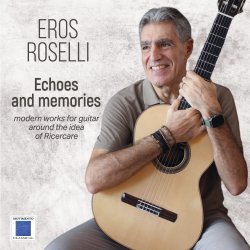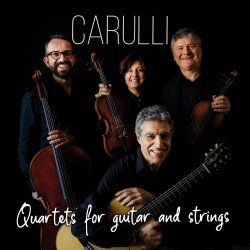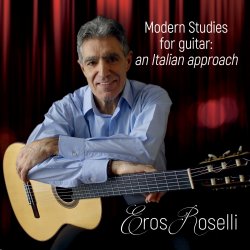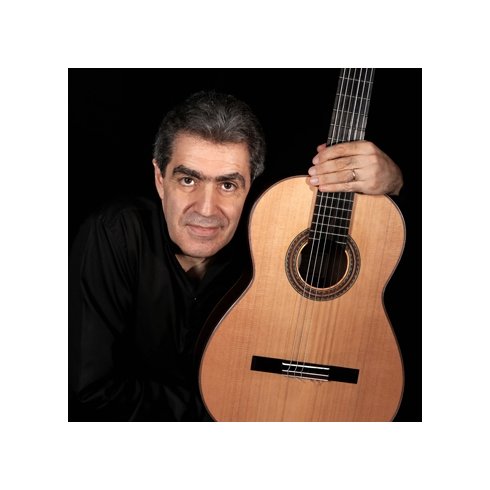

Modern Studies for guitar an Italian approach
Modern Studies for guitar an Italian approach
Born as a type of composition useful to practice a particular aspect of instrumental technique,the Studio developed, starting in the early 19th century, as a musical form aimed at being partof the great concert repertoire. Since it is expressly linked to the nature of a musicalinstrument, it also basically reveals the idea that the author has of it with regard to the soundand the idiomatic profile. From this point of view, the production of Studies offers a furtherand valuable reason for in-depth examination and evaluation of the instrumental literature.
Apart from the repertoire for violin, piano or other instruments, the Studies by Fernando Sor, Mauro Giuliani, Giulio Regondi or Francisco Tàrrega are enough to give comfort to this consideration regarding the history of the guitar. The program contained in this CD is entirely dedicated to Italian authors who lived in the modern era, from the beginning of the 1900s to nowadays. It is difficult to say whether a precise Italian style can be here delineated, it is sure that a continuity can be found in the path traced through the tracks. Mario Castelnuovo Tedesco, after having written dozens of works for six strings, starting from his meetingn with Andrès Segovia, in the final part of his career thought of a cycle of didactic compositions. An explicit invitation came to him from Ruggero Chiesa in the spring of 1967.
Unfortunately, the series of Appunti that was conceived did not come to a conclusion due to the death of the composer. Among the finished pieces we have the studies on the intervals which in some cases take the form of program music, with subtitles useful to reveal the idea
that inspired them. They confirm a grown composition skill for an instrument that Castelnuovo Tedesco did not play, placed at the service of an extraordinary musical style that has enriched the guitar repertoire. A dedication to Franco Margola, which Castelnuovo Tedesco signed on the 10th of May 1935 on a copy of his score for the drama Savonarola, represents an interesting confirmation of a not only formal relationship between the two composers. There are no other news of further contacts between the two musicians, evidently hindered by the forced exile of the Florentine musician in the United States. However, the document confirms that both took part of the same artistic-cultural milieu which also included Alfredo Casella, a composer that exercised a profound influence on Margola himself. In the abundant production for guitar of the musician from Brescia we find a series of very short Otto studi da concerto, published by the publisher Zanibon in 1970. These pieces stand out for their extraordinary ability to sum up and to effectively offer, to the fingers and the imagination of the guitarist, that idea of sweet and crepuscular sound that distinguishes Margola's production. A contemporary of Castelnuovo Tedesco, Giorgio Federico Ghedini, together with the above mentioned Casella, Malipiero, Respighi, Alfano and Pizzetti – with whom he formed the socalled "generation of eighty" – worked to restore the centrality of the instrumental music, drawing inspiration in particular from the 16th-17th century Italian heritage. In 1959 he wrote the Studio da concerto, unfortunately the only composition dedicated to the guitar. A very lively section is set in the center of a tripartite form, in which the last part explicitly recalls the first in the guise of a variation with ornaments, in the Baroque manner. The delicately hieratic character that livens up these two sections takes advantage from the slow rhythm, the type of intervals and the stylistic features with an archaic sound, not new in the work of Ghedini.
The interest for the guitar was certainly not marginal in Bruno Bettinelli either: in addition to a good number of works for solo guitar and chamber music pieces with guitar, he wrote also a Concerto for guitar and orchestra. The series of 12 studies, from which the 3 recorded here are taken, was written with the aim of focusing, in each piece, on the different elements that characterize the musical composition: the rhythm, the monody, the repeated notes, the chords... In this project, Bettinelli's contribution stands out for the testimony of how the markedly atonal language fully marries the expressive resources of the guitar, perhaps betterthan in the 18th and 19th century music.
All the authors listed up to now belong to the category of "non-guitarist composers". The program is therefore completed with the production of three guitarists also active in the field of composition. Mario Gangi, guitar teacher at the Rome Conservatory, in the final part of his Method for guitar, proposes 22 studies for guitar, which touch on different aspects of instrumental technique. His activity as an interpreter and composer has always taken place with a personal way of combining the "classical" language with the "popular" one (in particular jazz) at heart: his Studies do not escape this type of intent. The rich and multiform activity of Angelo Gilardino, who taught for a long time at the Alessandria Conservatory, has produced a series of 60 Studies of virtuosity and transcendence. The meticulous care in plumbing the innumerable expressive and technical potential of the guitar does not betray the stylistic code of his music, dreamy and melancholic. Gilardino's guitar sound, in favoring the resonances between the strings of the instrument in a somewhat static perspective, seems to reserve less importance for the use of "vibrato" and other expressive resources that characterize different aesthetic approaches. Approaches that alsoemerge in Studies included in this same recording project. The contents of the CD are completed by a series of 7 unpublished studies written by myself, each dedicated to a particular aspect of musical performance.




Eros Roselli
The guitarist Eros Roselli (promoter of the ensemble) studied with Ruggero Chiesa and won prizes and official acknowledgments at several competitions (Savona, Lagonegro, “F. Sor ”in Rome, Fundaciòn Guerrero in Madrid...). He has played a long series of concerts since 1985 and has held master classes in Italy, Switzerland, Germany, Austria, Spain, Croatia, Slovakia, Hungary, Lithuania, Russia, England, Denmark... American Record Guide wrote: “superb Italian guitarist Eros Roselli is a first-rate musician and he offers probing interpretations of even the most unassuming miniatures, employing his supple sense of phrasing, pristine articulation, and full tone to remarkably satisfying effect”.
Musician with multiple interests Eros Roselli has also been dedicating himself to composition for some years. Graduated in sociology at the University of Trento with a thesis on contemporary music, he is a guitar teacher at the Conservatory of Music in Padua. The experience gained in various institutional positions (including that of Director) led him to write a book on the reform of music conservatories titled “Exit from the ghetto?”, published in 2015 by Armando editore and a second work in 2018 entitled “Music and Conservatories”. Eros Roselli's activity is described in www.erosroselli.it.
